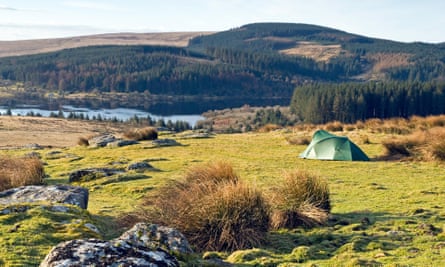Wild camping is once again allowed on Dartmoor after the national park won a successful appeal against a ruling brought by a wealthy landowner.
Camping had been assumed to be allowed under the Dartmoor Commons Act since 1985, until a judge ruled otherwise in January. It was the only place in England such an activity was allowed without permission from a landowner.
The case hinged on whether wild camping counts as open-air recreation, with a long-winded debate taking place in the appeals court. Lawyers acting for Alexander Darwall, the landowner, argued it was not, because when camping one was only sleeping rather than enjoying a particular activity.
Lawyers for the Dartmoor National Park Authority (DNPA) and Open Spaces Society countered that backpack camping was an ancient tradition and popular pastime on Dartmoor, and gazing at the stars before waking to the sound of the morning chorus was certainly open-air recreation.
On Monday, the appeals court panel, consisting of Sir Geoffrey Vos, Lord Justice Underhill and Lord Justice Newey, ruled that wild camping counted as open-air recreation and should therefore be allowed on the commons.
Vos said: “In my judgment, on its true construction, section 10(1) of the Dartmoor Commons Act 1985 confers on members of the public the right to rest or sleep on the Dartmoor commons, whether by day or night and whether in a tent or otherwise”.
He added that a walker who lay down for a rest without pitching a tent would be present for the purpose of open-air recreation. It was the same if that walker fell asleep. It made no difference if the walker rested or slept on a plastic sheet to prevent the damp, or in a sleeping bag to protect from the cold, or under a tarpaulin or in an open tent or in a closed tent to protect from the rain. The fact that a tent was closed rather than open could not convert the wild camping from being an open-air recreation into not being one.
Lord Justice Underhill said it was “a perfectly natural use of language to describe that as a recreation, and also as occurring in the open air, notwithstanding that while the camper is actually in the tent the outside air will be to some extent excluded”.
Darwall, a hedge fund manager and Dartmoor’s sixth-largest landowner, in 2013 bought the 1,619-hectare (4,000-acre) Blachford estate on southern Dartmoor. He offers pheasant shoots, deerstalking and holiday rentals on his land, and has been using the legal system to try to bar wild campers from camping on the estate without his permission.

Previously, Sir Julian Flaux, the chancellor of the high court, ruled that the meaning of the legislation was “clear and unambiguous” in that it conferred a “right to roam” that did not include “a right to wild camp without permission”. However, the appeals court noted that the Dartmoor Commons Act did not mention a “right to roam” but a right to “open-air recreation” if one entered the common on foot or horseback.
Lawyers for the DNPA appealed against the decision, arguing it hinged on a narrow definition of open-air recreation, where only activities such as walking, horse riding and picnicking were permitted. This could rule out activities such as bird-watching, landscape painting or stargazing, they argued. They also said it failed to take into account the historical understanding of the law, which many people, including the park authority, understood to mean a right to camp and leave no trace. The court granted it the right to appeal on this basis.
Kate Ashbrook, the general secretary of the Open Spaces Society, said: “This is an excellent outcome. We are relieved that the judges ruled unanimously and conclusively that open-air recreation includes backpack camping on the commons. We should like to see that right extended, and we shall campaign with other organisations to achieve this.”

